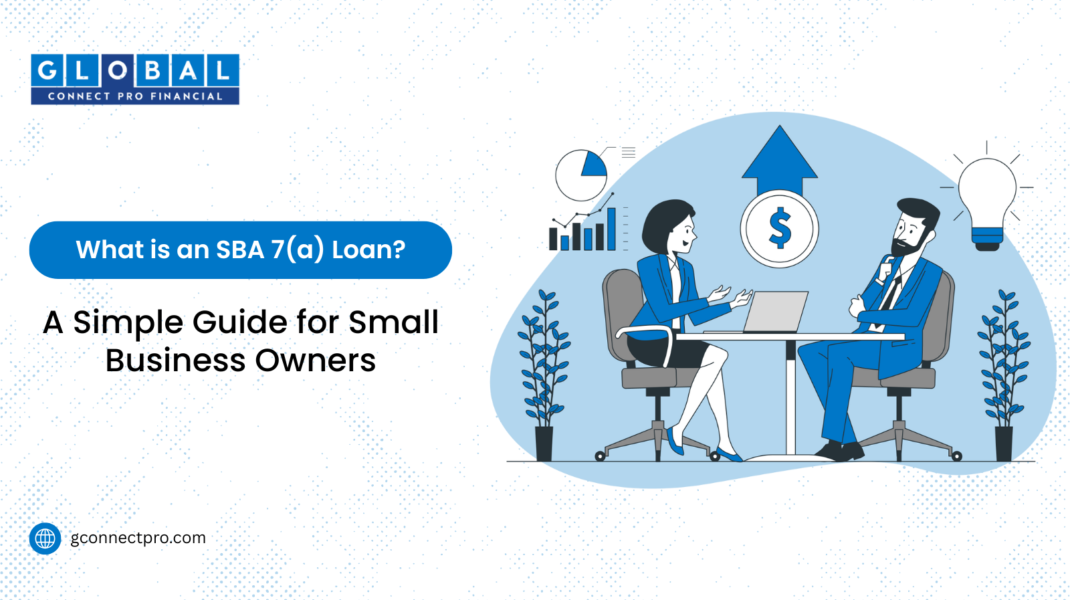What is an SBA 7(a) Loan? A Simple Guide for Small Business Owners

If you’re a small business owner in need of funding—whether to launch, grow, or simply stay afloat—you’ve likely come across the term “SBA 7(a) loan.” But what exactly is it? And why do so many entrepreneurs rely on it?
This guide is here to give you a clear and comprehensive understanding of the SBA 7(a) loan—what it is, who it’s for, and why it continues to be a go-to resource for small businesses across the United States.
What is an SBA 7(a) Loan?
The SBA 7(a) loan is a business financing program backed by the U.S. Small Business Administration (SBA). It allows small businesses to borrow money through approved lenders (like banks or credit unions), while the SBA guarantees a portion of the loan. This government backing reduces risk for lenders, which means small business owners are more likely to get approved—often with better terms and lower interest rates.
Who is it For?
The SBA 7(a) loan is specifically designed for small, for-profit businesses operating in the United States. It’s ideal for:
- Startups that don’t have years of financials yet
- Minority-owned or women-owned businesses trying to expand
- Businesses in underserved or rural communities
- Entrepreneurs who have been turned down by traditional lenders
From tech startups and coffee shops to local manufacturers and professional services—this loan can support a wide range of business types.
Common Business Situations Where SBA 7(a) Helps
To better understand its real-world value, here are a few situations where a 7(a) loan makes a difference:
- Opening a new location: A bakery wants to open a second storefront but lacks capital for build-out, rent, and staff. A 7(a) loan can provide the funding.
- Buying equipment: A landscaping company needs new trucks and tools. Rather than draining cash flow, they use the loan to invest in assets.
- Working capital boost: A retail shop needs extra funds ahead of the holiday season to stock inventory and ramp up marketing.
- Business acquisition: A manager wants to buy out a retiring business owner. A 7(a) loan makes the transition possible.
What Can the Loan Be Used For?
SBA 7(a) loans are known for their flexibility. They can be used for:
- Daily operations and working capital
- Purchasing inventory or raw materials
- Buying equipment, furniture, or machinery
- Renovations or leasehold improvements
- Purchasing commercial real estate
- Business expansion or opening new locations
- Refinancing business debt
- Buying another business
This wide scope makes the 7(a) loan a smart solution for both growth and sustainability.
Why Do Business Owners Prefer SBA 7(a) Loans?
There are several reasons why the SBA 7(a) loan is so popular:
- Lower interest rates than most traditional loans
- Longer repayment terms (up to 10–25 years depending on the purpose)
- Smaller down payments, preserving your cash flow
- No balloon payments, making monthly budgeting easier
- Availability to newer businesses with limited history
These benefits make the 7(a) loan more accessible and manageable—especially during times of economic uncertainty or growth transitions.
Important Notes to Consider
While the SBA 7(a) loan is attractive, there are a few things to keep in mind:
- It involves a detailed application process, including financial documents and a business plan.
- Many loans require a personal guarantee, meaning you’re personally liable if your business can’t repay.
- Strong credit and cash flow help increase approval odds, though lenders evaluate the full picture.
Also, the time to funding can be longer than online or alternative loans, so it’s best for planned expenses rather than emergency needs.
Final Thoughts
The SBA 7(a) loan is more than just a source of money—it’s a bridge that helps small businesses move forward with confidence. Whether you’re just starting out, facing a cash crunch, or ready to scale up, this loan program offers the kind of flexible, affordable financing that small businesses often struggle to find elsewhere.
By understanding how it works and what it can do for your business, you’re already taking a powerful step toward smarter financial decisions.

